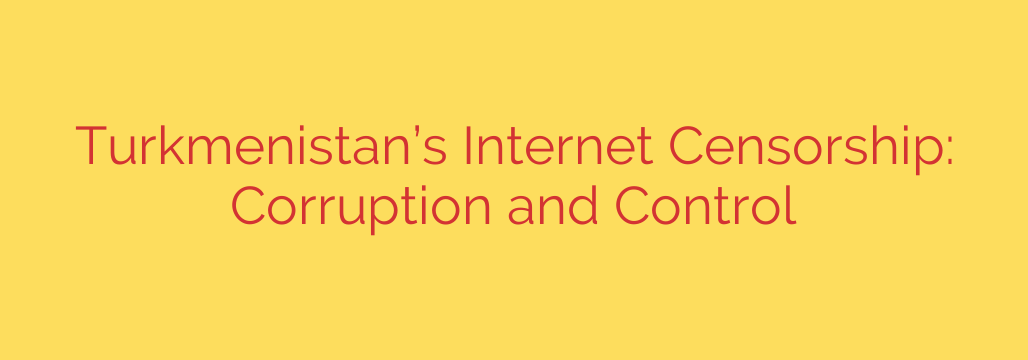
Inside Turkmenistan’s Digital Fortress: Unpacking a System of Censorship and Control
In an era defined by global connectivity, the internet serves as a gateway to information, communication, and economic opportunity. Yet, for the citizens of Turkmenistan, this digital world is a heavily guarded and sanitized space, managed by one of the most restrictive censorship regimes on the planet. The reality of internet access in the country is not just a matter of technical limitations; it is a carefully constructed system designed for absolute information control, fueled by both political motives and financial corruption.
The Reality of a Controlled Connection
Accessing the internet in Turkmenistan is a fundamentally different experience than in most of the world. The entire infrastructure is controlled by a single state-owned entity, Turkmen Telekom, which acts as the sole gatekeeper. This monopoly allows the government to dictate every aspect of the digital experience.
As a result, citizens contend with an internet that is among the slowest, most expensive, and most heavily filtered in the world. Basic activities like streaming a video, participating in a video call, or even loading a news website can be an exercise in frustration. Popular social media platforms, independent news outlets, and foreign communication services are completely inaccessible through normal means. This digital isolation is not an accident; it is a deliberate policy.
How Turkmenistan Enforces Its Digital Blockade
The cornerstone of Turkmenistan’s censorship apparatus is a sophisticated and all-encompassing national firewall. This system actively blocks access to tens of thousands of websites and online services deemed undesirable by the state. The official justification often revolves around protecting national security and traditional values. However, the practical application reveals a much broader agenda: to prevent citizens from accessing independent information, stifle dissent, and control the narrative both inside and outside the country.
This digital blockade effectively creates a state-approved version of the internet known as “Turkmennet.” It is a small, walled-off ecosystem of local websites and services that operate under the watchful eye of the authorities. Anything that challenges the government’s official line or offers a glimpse into unfiltered global discourse is systematically blocked.
Censorship for Profit: The Hidden Financial Incentives
While political control is the primary driver of this censorship, a deeper investigation reveals a powerful financial motive. The technology and services required to maintain the national firewall are not built in-house. Instead, the government awards lucrative contracts to private companies to implement and manage the blocking technology.
Critically, these contracts are often awarded through opaque processes to firms with close ties to the ruling elite. This creates a perverse incentive structure where internet control is not just a tool of political repression but also a highly profitable business for a select few. The more extensive the censorship, the greater the need for advanced filtering technology, leading to larger government contracts. Furthermore, reports suggest that the process for getting a website unblocked is shrouded in secrecy, creating opportunities for corruption and bribery.
The Digital Lifeline: VPNs Under Siege
For ordinary Turkmen citizens seeking a connection to the outside world, Virtual Private Networks (VPNs) have become an essential tool. A VPN can encrypt a user’s internet traffic and route it through a server in another country, effectively bypassing the national firewall and unlocking the global internet.
However, the government is acutely aware of this workaround. The authorities are engaged in a constant cat-and-mouse game, actively identifying and blocking the IP addresses associated with popular VPN services. This forces citizens to constantly search for new, functional VPNs, turning the simple act of accessing information into a persistent struggle.
Navigating Digital Restrictions Safely
For those seeking to bypass censorship and protect their online privacy, whether in Turkmenistan or other restrictive environments, taking careful precautions is paramount.
- Choose a Reputable VPN: Avoid free VPN services, which may log your data or offer weak security. Opt for established, paid providers known for their strong privacy policies and advanced features.
- Use Obfuscation Technology: Look for VPNs that offer “obfuscated servers” or “stealth mode.” This technology disguises VPN traffic as regular internet traffic, making it much harder for firewalls to detect and block.
- Practice Strong Digital Hygiene: Use strong, unique passwords for all your accounts and enable two-factor authentication (2FA) wherever possible.
- Utilize Secure Messaging Apps: For sensitive communications, rely on end-to-end encrypted messaging apps like Signal, which ensures that only the sender and recipient can read the messages.
Ultimately, the situation in Turkmenistan is a stark reminder that internet freedom cannot be taken for granted. It highlights how digital infrastructure can be weaponized for control and profit, creating a digital iron curtain that isolates an entire nation from the global community. The quiet resilience of its citizens, who continually seek out ways to connect and learn, underscores the universal human desire for knowledge and freedom.
Source: https://blog.torproject.org/Corruption-Control-Turkmenistan-internet-censorship-business/








